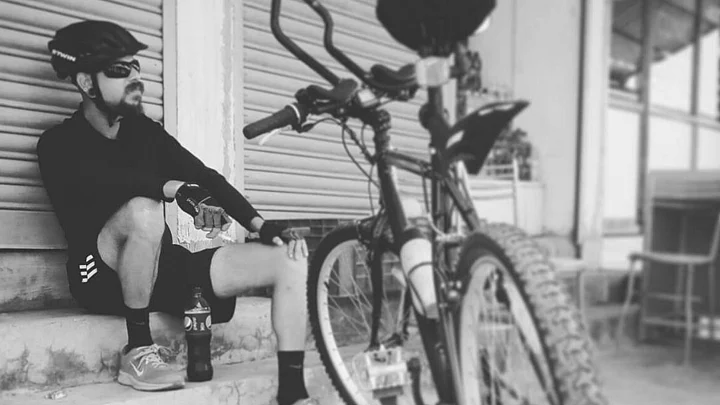On December 7, 2016, I went for my first ride. It wasn’t too long a distance, just from my home in Deonar to Bandra and back. There was something about riding around Mumbai at night. The weather was great and with no traffic on the roads, it took me just about an hour, including a brief break. It gave me a sense of how small the city actually is, as compared to our perception of Mumbai city from our daily commutes. When I got home, I knew that I could have done a lot more than 25 Kms. I was hooked and I wanted to take my bike out again and do another twenty-five. So, the next night I did fifty, and then a hundred.
By the end of the week, I jokingly mentioned to my partner that with the number of kilometres I had racked up, I could have easily reached Goa by now, and maybe I should give long distance cycling a try. She said, “Well, why don’t you?” Cycling was helping greatly with my moods and I could feel my head and body getting better too. Something made me feel that there was more to this hobby, than I had imagined.
This was how Spreading Cycology was born.
I had been researching mental health in rural India for a few months around that time. My partner and I run a social enterprise called CraYon Impact, through which we talk about mental health and disability, with the use of performing arts. Somewhere along our year old initiative, we realised that our message mostly appeals to the urban Mumbaikar. But what we really wanted to do was reach out to people living in small towns and rural areas, and to bring awareness about their issues to urban India. Since close to 70% of India’s population resides in its rural fringes, this inadvertently does affect everyone.
The W.H.O predicts that by 2020-25, 20% of Indians will suffer from a mental illness. At the moment, we barely know how to deal with it.
A majority of the population is just beginning to understand how serious mental illness is, since it has now begun to affect most families and communities directly. It is currently the biggest health problem we face.
I realized that if I were to do a long distance ride, I could make use of this opportunity, since I was going to be riding through small towns and villages. I could film my journey, speak to locals to get a sense of the rural infrastructure for mental health, and bring more stories to light. This was the best time to work on a project like this, since discussions around mental health have only increased in the last couple of years and it’s important to keep them going.
On February 1, 2017, I set out on my first ride from Mumbai to Bangalore via Goa and Kochi. As soon as I reached Mazgaon, in Raigad district, 150 kms from Mumbai, I began seeing major problems concerning mental health, that continued all the way to Ratnagiri, 400 kms away.
Most of coastal Maharashtra barely had any medical facilities, leave alone those catering specifically to mental health. People had to travel, sometimes, over 50-100 kms, to reach the nearest OPD.
Each state that I visited had its own set of problems and these were sometimes apparent merely by crossing borders. I slowly began to realise that cycling was the only way I could have truly understood all of this. Travelling at 20km/h, it was hard to miss anything. I stopped to talk to hundreds of people and I experienced, if only for a few moments, every problem first hand, whether infrastructure-related or otherwise.
My team and I were particularly affected by our experience in Guhagar, Maharashtra, since it had to do with a cross-section between disability and mental health. According to Dr Balasaheb Dhere, who heads the Guhagar Handicap Association, there are over 1000 individuals with disability in every 20000 people. The lack of roads and infrastructure only add to their problems and make access even more difficult.
One of the women I met at the NGO headquarters had to give up her education in 11th standard, because there was no one to carry her to the main road, from where she could take a bus or a rickshaw to her school. As a result, this woman could not follow her career path to becoming a primary school teacher.
After covering more than twenty villages and towns spanning over a distance of more than 2000 kms in the first leg of Spreading Cycology, I am now embarking on the second leg from Mumbai to Chandigarh, via Indore, Ahmedabad, Jaipur and New Delhi. This time too, I will ride through 20-30 small towns and villages spanning over 2300 kms.
Through my journey, I have learned that people are not statistics. It is also clear to me that we have no choice but to tackle mental health at a micro level, taking into account societal and cultural impacts on various communities across the country. Thanks to Spreading Cycology, I have seen a lot more in a few months than I have in all my life. But getting on that saddle and talking to people has further strengthened my belief that mental health problems need to be addressed with great urgency.
While there is a severe shortage of mental health professionals in the country, we can’t ignore the people who are doing the best they can, given the limitation of resources and infrastructure.
I hope that when I get back home, I would’ve done justice in bringing their work to the forefront.
(Rohan Sabharwal is an award-winning documentary filmmaker and social entrepreneur who has been fighting stigma and misconceptions around mental illness ever since he came out with his illness.)
(At The Quint, we question everything. Play an active role in shaping our journalism by becoming a member today.)
